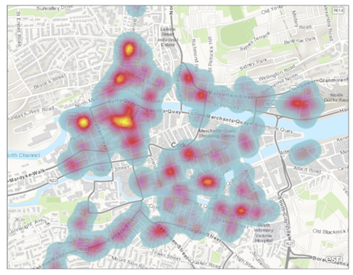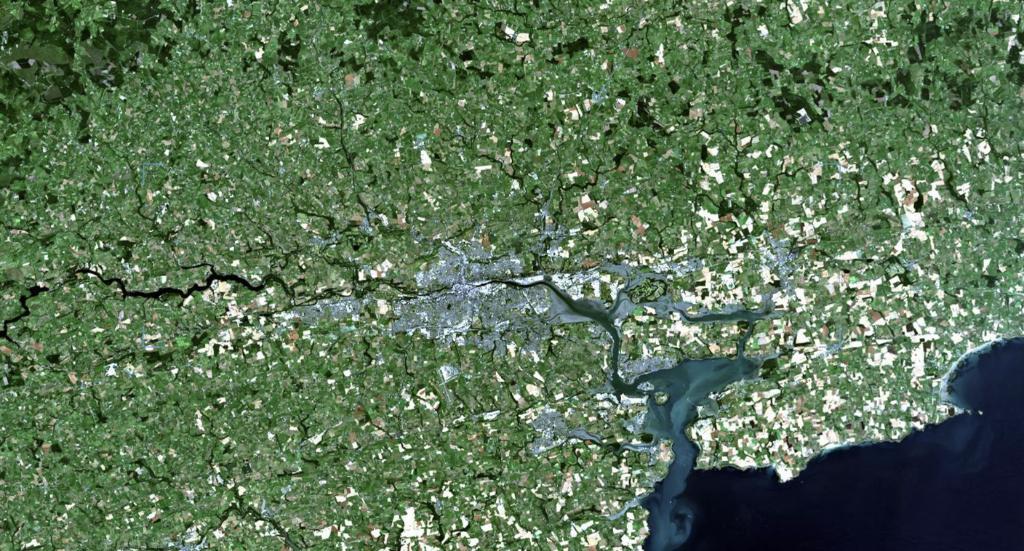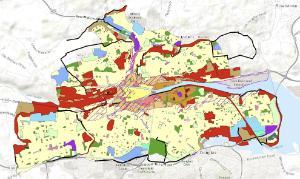Digital spatial data for exploring and communicating our changing world:
The UCC Geoinformatics research cluster has several key foci; environmental time series analysis using satellite Earth Observation, GIS and spatial ecology, geocomputation, GIS and urban geographies, digital geographies, and cartographic atlas outputs for diverse audiences, with a number of current projects in all these areas.
Staff members
Fiona Cawkwell: I am a senior lecturer in Remote Sensing and Physical Geography. My research and teaching interests cover all aspects of Earth Observation, particularly satellite based applications, although with a growing interest in uncrewed aerial systems, and also aspects of physical geography relating to land cover, land use and change with respect to human activity and climate changes. I teach across a range of introductory and more advanced image processing concepts, and environmental applications of remote sensing, as well as introductory level geomorphology and research methods. My research interests cover a range of different land covers from saltmarshes to glaciers, grassy fields to coastal sand dunes - and how they are changing over time through gradual events such as coastal sqeeze or sudden events such as wildfires. Find out more about what I do here.
Paul Holloway: I am a senior lecturer in Geographic Information Systems and Spatial Ecology. My research and teaching interests include the application and development of GIS, spatial analysis and modelling and geocomputation to address a suite of geographical, environmental, and ecological issues. I am primarily a lecturer in GIS where I teach a wide variety of theoretical and conceptual issues, and lead practical sessions in a range of applications. I also lecture in spatial ecology, having developed a module that discusses the theory of biogeography and landscape ecology, implementing GIS to address ecological issues. Find out more about what I do here.

Maedhbh Nic Lochlainn: I am a Lecturer in Human Geography and GIS. My research interests are at the intersection of urban and digital geographies, and I am particularly interested in urban financialisation, housing, and the transformation of urban space as digital/material process. I teach across a range of undergraduate and postgraduate modules in geography, but have particular strengths in critical GIS, digital/urban geographies, and research methods. Find out more about what I do here.
William Durkan: I am a Lecturer in Human Geographer and GIS. My work focuses on Electoral Geography and Environmental Politics and I teach across a range of modules in HDip in GIS.
Mike Murphy: I have been cartographer at the Department of Geography, University College Cork for over twenty-five years, and have worked on the Tlas of the Irish Revolution (2018), Atlas of the Great Irish Famine (2012), The Iveragh Peninsula: A Cultural Atlas of the Ring of Kerry (2009), and the Atlas of Cork City (2005)
Other UCC partners include MaREI Applied Remote Sensing and GIS group; Environmental Research Institute; Department of Archaeology
Postdoctoral researchers in the Geoinformatics research cluster as of October 2023 are:
| Name | Project | Funding agency |
|---|---|---|
| Sam Hayes | StableGrass; Multiscale remote sensing of grassland biodiversity, yield and functional traits | DAFM |
| Parvaneh Nowbakht | TRANSLATE 2; Developing Climate Services for Sectoral Adaptation | Met Eireann |
| Raul Sampaio | FLARES-PPLUS; Spatial and temporal trends of wildfires in Ireland over the last 30 years from satellite imagery | EPA |
| Camila Tavares Pereira | Transferability of resilience in informal settlements (TRIS): a model for assessing climate risk and empowering women as decision makers | SFI |
Junior Career Researchers
PhD students in the Geoinformatics research cluster as of October 2023 are:
| Name | Topic | Supervisors | Funding agency |
|---|---|---|---|
| Emma Chalencon | Cork coastline vulnerability assessment from remotely sensed and field data | Fiona Cawkwell and Jimmy Murphy (School of Engineering) | Cork County Council |
| Talia Huffe | Land use and sustainability – exploring the potential of alternative proteins | Paul Holloway and colleagues from Teagasc | Teagasc |
| Hannah Mealy | The ability of a naturally established forest on cutaway peatland to sequester Carbon | Fiona Cawkwell and Paul Leahy (School of Engineering) | Bord na Mona |
| Alex Castellon Meyrat | Indicators of Soil Health | Paul Holloway and colleagues from Teagasc | Teagasc |
| Daniel Moloney | A study investigating the conservation strategies deployed in both captive and wild settings with particular focus on behaviour and movement of animals | Paul Holloway and colleagues from the School of BEES and Fota Wildlife Park | Fota |
| Brid O'Connor |
The status of sensitive fish species within Irish waters and their vulnerability in relation to fishing and discarding practices
|
Paul Holloway and colleagues from the Marine Institute | Marine Institute |
| Rafael da Silva Damasceno Pereira |
Assessing climate risk in informal settlements and empowering women as decision-makers
|
Paul Holloway and Camila Tavares Pereira | SFI |
Research assistants in the Geoinformatics research cluster as of October 2023 are:
Research Led Teaching
The staff of the Geoinformatics Research Group are committed to educating the next generation of students about GIS and remote sensing, and so are involved in a number of postgraduate and undergraduate programmes. The two primary Geoinformatics postgraduate degrees are the MSc Geoinformatics and the HDip GIS - you can find out more about the programmes by clicking on the name. Both these programmes are recruiting students to start in September 2024.


